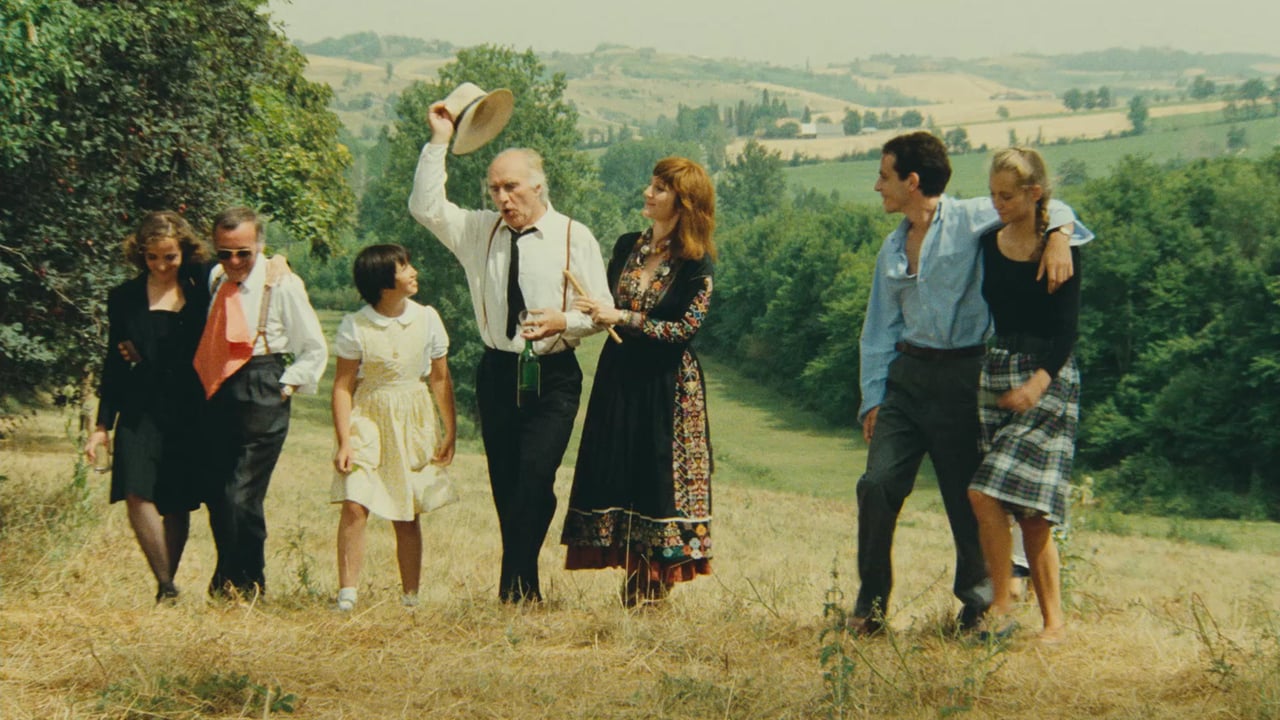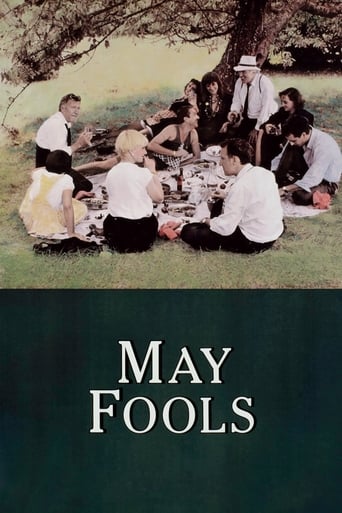

While France is threatening to erupt into revolution during the beautiful spring weather of May 1968, a family of the haute bourgeoisie assembles at a large country house in the lovely Gers area of the South-West for the funeral of the matriarch and the division of her goods. The former is delayed because municipal workers, including the gravediggers, have all gone on strike, while the latter is disrupted by two events. First, the notary arrives to read the will, which gives 25% of movables to the young housekeeper, who has been comforting the eldest son Milou, leaving only 75% for the family. Then the old lady's jewels are found short, raided by a granddaughter who promptly renews an old association with the notary in the hay loft.So the time passes, between and during meals, with wrangles over material goods and many amatory diversions. One might almost think that this group of people, most of whom who have little or no concern about the events convulsing their country, are interested only in food, money and sex, plus a bit of music and marijuana. Aftre alarming reports of impending disaster on the radio and from rich neighbours, panic seizes them. Abandoning the delightful house and without taking anything useful, they irrationally hide in the woods. Cold, wet and hungry, they are saved by the housekeeper, who finds them to give the news that President de Gaulle is back in charge of the nation and everything will return to normal. After at last burying the old lady, the family return to their preoccupations: the spectre of revolution has passed.Altogether it could be a posthumous piece by Buñuel, which is not surprising as the script is by his long-lived and prolific collaborator, Jean-Claude Carrière. Surrealism has several outings, from the opening where the eldest son calms his bees by declaiming Latin verse to the ending where his dead and buried mother returns to the empty house to dance with him. While the impotence of the bourgeoisie, imprisoned in their obsessions, recalls the trapped party in "El ángel exterminador" as well as the couples on their inescapable carousel in "Le charme discret de la bourgeoisie", the subsequent flight into wilds that are not Eden evokes "La muerte en este jardín". In the end, the character who really shows common sense and care for others is the housekeeper, a working-class woman.Despite many echoes of the provocative Spanish maestro, this work is wholly French in feeling and execution. Even the one foreign actress, Harriet Walter playing an Englishwoman, speaks the language excellently.
... View MoreAs the story begins, an elderly woman is seen in her kitchen. Suddenly, something strikes her and she dies in front of our eyes. Milou, her oldest son, living in the estate, tries to notify the family that are scattered all over France. It is a difficult time for the country. May of 1969 marked a serious time for France as hordes of left wing individuals took to the streets in protest against one of the most beloved figures, General Charles DeGaulle. As the family pours in, the situation begins to turn ugly. Even in this peaceful corner in rural France, people are seen in the country lanes singing The International and carrying communist flags. The first to arrive is Camille, Milou's daughter. Married to a doctor, and with three children, her mind is on whatever can be sold to be divided among the heirs. Her love toward the dead grandmother is clearly not so strong.The other sibling, Georges, comes in with his English wife, Lily, a sensual woman, much younger than her husband. Claire, a niece by way of Georges and Milou, arrives with a female companion, showing obvious signs of being in a lesbian relationship. Claire's parents died in an automobile accident, leaving her to claim a third of whatever is made out of what the family decide to sell.Everyone is surprised when Daniel, the notary, comes to read the dead lady's will. Adele, the loyal servant, has been made a lawful heir, so the estate must be divided by four. Calculating Camille has taken care of stealing an emerald ring from her grandmother's jewelry chest without telling anyone. Claire is the only one that questions her cousin. Much bickering goes on as nothing is found to have great value, but the land and its vineyards might bring a decent prize, but Milou, having lived in the place all his life does not want to part with it. To complicate the situation, there is a problem with the burial of the dead lady. The grave diggers at the local cemetery are on strike, so the woman continues to be laid out at the house without no clear solution in mind. That problem does not interfere with some merrymaking from the family as they get giddy with drink. The arrival of a truck driver who could not continue his journey because of the barricades, and some scared neighbors, make the group abandon the house and go into the adjacent woods where all kinds of mishaps befall them until the political situation gets clear and everyone can go back to their lives, but leaving Milou alone in the house with his memories of happier times, and abandoned by the clan."May Fools" was one of Louis Malle's best films, yet it is seldom seen nowadays. With a screenplay by Jean Claude Carriere and the director, the film evokes "Uncle Vanya", a theme which Mr. Malle explored in his wonderful "Uncle Vanya on 42nd Street" on his last work for the screen. Against the turmoil in France during that fateful May, the creators work to create an atmosphere about a family in crisis, juxtaposing the action against the political situation reigning at the time. The idea of upcoming changes in France caused panic among the bourgeois family members, as it presented a menace to their way of life, as they knew it. The younger relatives took a different view, in contrast with what was expected of them.The great Michel Piccoli made a wonderful patriarch figure in his take of Milou. His work in the film was among the best things he was called to play. Milou was powerless in the machinations that were all around him. Miou Miou's Camille shows a callous woman who is only interested in her own welfare, not caring for the rest of the family. Dominique Blanc is excellent as Claire. The supporting cast impresses, especially Harriet Walker, Francois Berleand, Michael Duchaussoy, Bruno Carette, Martine Gautier and Paulette Dubost, who is the dead Mrs. Vieuzac throughout the film. Lovingly photographed by Renato Berta and with a jazzy musical score by Stephane Grappelli, "May Fools" is worth a look by serious fans of the Louis Malle.
... View MoreLouis Malle was one of the most notable members of the Nouvelle Vague (New Wave) french movement that was an alternative to film reconstructions historical and literary adaptations commonly "infidels" as they used to do filmmakers Delannoy, Autant-Lara and some others, because, unlike these, the New Wave advocated an approach to the problem of the individual to privacy, their personal experiences. But like the rest of their comrades (with the exception of Truffaut), Louis Malle also realized that this new path, it could anchor a bourgeois and individualistic conception of life and needed to be linked to analysis of social problems, seeking more openness and greater narrative ideological commitment. So did "Lacombe Lucien", an energetic recreation of the effects left by fascism. And, among others, "Alamo Bay", on the reaction of the Vietnamese Americans living there, after the failure of the war.Until that arrives "MILOU EN MAI", a metaphor for the state and the system, full of irony and black humor of the finest. Milou's mother, Mrs. Vieuzac, is representing the state: the owner of everything. Their children, grandchildren and sons-in-law, are the bourgeoisie, owners of power in the state. Claire, the maid, is the proletariat, the heir to only a quarter of the estate of Mrs. Vieuzac. The main prototypes come to life: the landowner, the reactionary intellectual, trader, bourgeois ladies... With a delicious dialogue through participation in the old script by Luis Bunuel collaborator Jean Claude Carriere ("Now women complicated everything. Before they knew it was not an orgasm and it was easier"), a delightful musical score with the great jazz style of Stephane Grappelli, and beaten with that herd, Louis Malle reconstructs the warm and vibrant time of May 68', in which there was a social class who knew everything, understood everything and was consistent with everything... until that any solace to meddle in its liabilities.In a wonderful characterization, Michel Piccoli represents Milou, the provincial intellectual who suddenly is surrounded by its unique family at the announcement of the death of his mother. When that nice breed, feel that the facts are about to touch them directly, they decide to leave the field (are excluded). What follows is better that you see it, you'll find people have probably already seen in your neighborhood or on your street and you'll realize, perhaps, that many things are not as they seem. "MILOU EN MAI", is a piece of film hard to forget.
... View MoreMalle made only two films after this one, Damage, and Vanya On 42nd Street and it's tempting to view Milou en Mai as a rehearsal for Vanya though in the end the differences outweigh the similarities. It IS set on a country estate that is running to seed and there IS a 'Vanya' figure in Milou himself (Michel Piccoli) who more or less tends the estate in the absence of his siblings - one deceased, one pursuing his own career. There IS a family gathering with all that that implies, bickering, truth-telling, laughter, tears, accusations, recriminations etc. Perhaps above all it is a MOOD piece which does put it in the same universe as Chekhov but it is ultimately too easy to read it in this way. It was a masterstroke to place it at the time of the student riots in Paris, May, 1968 and this strengthens the links with Chekhov who, of course, wrote his own masterpieces at a time when Russia was undergoing changes unacknowledged by his gentlefolk with their heads in the metaphorical sand of dachas serenely remote from the turbulence. This is a film of great lyricism and melancholia with a gentle Jazz music score by Stephane Grappelly and the action, such as it is, is kick-started by the death of Milou's mother which necessitates summoning the family for the funeral. Again like Chekhov what we have here is an ensemble piece rather than Leading Man, Leading Lady, Juvenile, Ingenue, etc and the acting is uniformly excellent from Miou-Miou as Milou's daughter, Camille, to Francois Berleand as the family lawyer who drives a red Alfa Romeo and still carries a torch for Camille, to Valerie Lemercier in the small but telling role of Madame Boutelleau. The events in far-off Paris punctuate but are not allowed to dominate and barely to influence the action leaving the family - and non-family - to quarrel, couple, fail-to-couple and relate the occasional home truth. In short a lovely Autumnal movie.
... View More